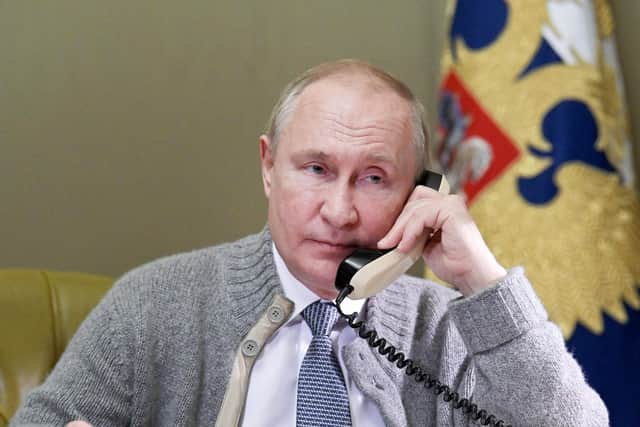Ukraine: Giving Vladimir Putin what he wants may not prevent Russian aggression – Martyn McLaughlin
This is about Russian ambition, and in particular, Vladimir Putin’s long-standing failure to come to terms with the break-up of the Soviet Union.
He has never believed that Ukraine, or countries like Belarus, are entitled to independence or sovereignty. The pursuit of bringing them back into the fold of a “historical Russia” has, for him, been an obsession.
Advertisement
Hide AdAdvertisement
Hide AdIt is one he articulated at length back in July via a rambling 5,000-word essay which framed Ukraine as a sub-national region. In it, Putin described its citizens and Russians as “one people”, and railed angrily against the idea that Ukraine has – or should have – a distinct history and identity of its own.
The declaration was the most explicit rejection yet by Putin of the Budapest Memorandum, which saw Russia provide assurances that it would respect Ukraine's territorial integrity.
The fact that this week marks the 30th anniversary of the formal dissolution of the USSR has no doubt emboldened Putin to further weaponise that lingering nostalgia for Soviet power, and in hindsight, his self-indulgent treatise reads like an ideological pretext for further military action.
Quite how far he will go to turn his imperialist rhetoric into action remains to be seen, but it is worth pointing out that even in the prelude to a full-scale ground invasion, Russian aggression in the region has already had devastating consequences in recent years.
Around 14,000 people have been killed since Russia seized Crimea seven years ago, an affront which sparked a grim frontline conflict in Ukraine’s Donbas region. It is one which continues to this day in a vast labyrinth of muddy trenches which would not have looked out of place on the Western Front.


Such a grim reality ought to dissuade those who should know better from characterising the Russian threat as theoretical. It is very much real, and it has already caused a great deal of bloodshed.
The question of how, and when, that conflict might intensify is one which looks set to dominate the first days and weeks of 2022. The rallying of close to 100,000 Russian troops around Ukraine for a month-long programme of drills has given way to the promise of talks in early January.
That is encouraging, yet it is hard not to conclude that the terms of Russia’s draft of proposed agreements with the US and Nato – demands already made public by Moscow – were designed to be rejected. It is, for example, difficult to see that Washington would agree not to establish military bases, or engage in “bilateral military cooperation” with former Soviet states. And the Russian insistence that Ukraine should never become a member of Nato is effectively a request to disavow its sovereignty.
Advertisement
Hide AdAdvertisement
Hide AdAcquiescing to such calls would only encourage Putin to expand his reach across those former republics and beyond, further jeopardising the security of those countries and others further afield. As has been pointed out by Orysia Lutsevych, head of the Ukraine forum at the Chatham House think tank, Russia’s designs, if implemented, would irrevocably alter the security situation across the continent.
“Russia’s proposed two draft treaties outline the establishment of a two-tier Europe – one with the right to defend itself from Russian encroachment, while the other must accept Russian supremacy as a new geopolitical reality,” Ms Lutsevych concluded. “Put simply, this would mean former republics of the USSR such as Ukraine are denied the right to exist as fully independent states.”
Western media reports from Kyiv suggest there is no imminent panic among ordinary Ukrainians about a major invasion, and Moscow must know that if it gambles and fails, it will push Ukraine closer towards Nato – a scenario Putin can barely countenance.
Even so, it would be careless to characterise his warnings of a “military-technical” response from Moscow as that of an ageing KGB spy crying wolf. The demands set out in its draft treaties may not be regarded as realistic expectations, but that does not mean that Russia is not intent on achieving them by whatever means possible.
The danger in all this is that the response from the US and its allies emboldens Putin to take the most drastic course of action available to him. Joe Biden’s administration has said Russia will be forced to endure unprecedented sanctions if it steps up its invasion of Ukraine, but his inability – or unwillingness – to sketch out a credible military response weakens his stance.
Closer to home, the EU can and must do more to spell out what it would do in the same circumstances. The threat of paralysing the Nord Stream 2 gas pipeline, which runs between Russia and Germany, is just one option.
As for the UK government’s response so far, lamentable barely covers it. Defence Secretary Ben Wallace has already said that the UK is unlikely to send troops if a Russian invasion proceeds. In doing so, he squandered whatever shards of leverage Britain still has on the world stage.
The upcoming talks will reveal more about Russia’s intentions, and the western alliance must approach them with care. At every point, they should ask themselves one key question – would giving Russia what it wants prevent the worst case scenario from coming to pass?
A message from the editor:
Thank you for reading this article. We're more reliant on your support than ever as the shift in consumer habits brought about by coronavirus impacts our advertisers. If you haven't already, please consider supporting our trusted, fact-checked journalism by taking out a digital subscription.
Comments
Want to join the conversation? Please or to comment on this article.
